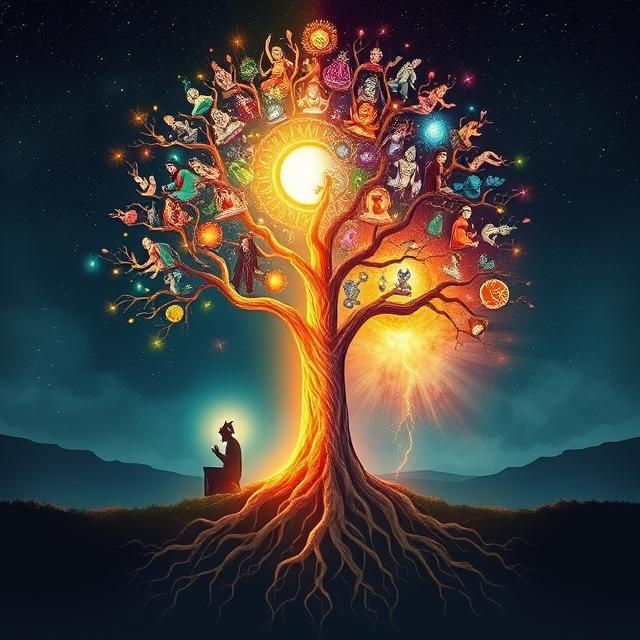
Table of Contents
Monotheism vs Polytheism: Does One Offer a Deeper Meaning to Life?
In the world of religious thought, one of the oldest and most profound divides is the one between monotheism and polytheism. Do we live in a universe created by a single all-knowing deity, or do many divine forces shape the cosmos? And more importantly: which worldview offers deeper meaning?
This is not just a matter of theology, but a reflection of how humans interpret reality, morality, purpose, and the divine. Let’s explore the foundations, implications, and philosophical depth of each system.
I. Definitions and Core Concepts
Monotheism
Monotheism is the belief in one, supreme, all-powerful deity who governs everything. It is most closely associated with the Abrahamic religions:
- Judaism: God as the moral lawgiver.
- Christianity: God as both just and loving, revealed in Jesus Christ.
- Islam: Allah as the absolute and indivisible Creator.
Monotheism generally views God as omniscient, omnipotent, omnipresent, and morally perfect.
Polytheism
Polytheism is the belief in many gods, often with distinct roles and personalities. This system characterizes many ancient and modern traditions:
- Hinduism (though also complexly monistic at times)
- Ancient Greek, Roman, and Norse religions
- Shinto, African traditional religions, and many Indigenous worldviews
Gods in polytheism are often embodiments of natural forces, archetypes, or cosmic principles, and their interplay creates meaning through balance and story.
II. Narrative Depth and Meaning-Making
Monotheism: Unity, Purpose, and Moral Order
Monotheism offers a unified narrative:
- One God = one origin, one destiny, one purpose.
- Life has cohesive moral meaning because it is governed by a single divine will.
- Suffering and evil, though mysterious, can be understood within a grand cosmic plan.
This gives many believers a strong sense of identity, cosmic belonging, and moral clarity.
Polytheism: Complexity, Diversity, and Human Resonance
Polytheism reflects the plural nature of life itself:
- Love, war, wisdom, harvest—each realm has its own divine face.
- Myth becomes a mirror for human emotions and stories.
- Meaning emerges from navigating tensions, not resolving them into a singular truth.
Polytheism allows for personalized devotion, moral ambiguity, and storytelling as spiritual practice.
III. Psychological and Philosophical Dimensions
Monotheism:
- Encourages transcendence: God is often wholly “other,” beyond nature and comprehension.
- Demands moral accountability: a divine judge sees all.
- Promotes existential security: all things have a reason.
Critics argue it may lead to dogmatism or the suppression of diversity.
Polytheism:
- Encourages immanence: the divine is woven into nature and daily life.
- Affirms multiple truths: different gods, different perspectives.
- Resonates with archetypal psychology (Jung, Campbell): gods as inner forces.
Critics suggest polytheism may lack ultimate unity or feel less intellectually rigorous.
IV. Historical and Cultural Impact
Monotheism’s Global Influence
- Inspired monotheistic empires (Rome post-Constantine, Islamic caliphates).
- Shaped concepts like human rights, progress, and salvation.
- Brought the idea of universal morality to law and governance.
Polytheism’s Enduring Presence
- Gave rise to rich mythologies, rituals, and cosmologies.
- Fostered cultural pluralism and syncretism.
- Remains alive in Hinduism, Shinto, and many neo-pagan movements.
V. Which Offers Deeper Meaning?
The Case for Monotheism:
- Coherence: one God gives a unifying framework.
- Moral depth: good and evil are objective realities.
- Existential weight: life is sacred, purposeful, and judged.
The Case for Polytheism:
- Psychological realism: gods represent aspects of the self.
- Narrative richness: meaning is found in nuance, not certainty.
- Sacred diversity: multiple ways to relate to the divine.
Some modern philosophers and theologians propose a middle ground:
- Monism (e.g., Brahman in Hinduism): one reality, many expressions.
- Panentheism: God is both transcendent and immanent.
These frameworks combine the unity of monotheism with the multiplicity of polytheism, suggesting the two aren’t always mutually exclusive.
VI. Conclusion: The Meaning You Seek
So which worldview—monotheism vs polytheism—offers deeper meaning? The answer depends on what kind of meaning you’re seeking:
- Clarity and certainty? Monotheism offers a clear map.
- Connection and nuance? Polytheism provides a textured landscape.
Both traditions attempt to answer the same human questions:
- Why are we here?
- What is sacred?
- How should we live?
In the end, deeper meaning isn’t found in the number of gods, but in how fully a worldview helps us become more aware, more compassionate, and more in harmony with truth—whatever form it takes.